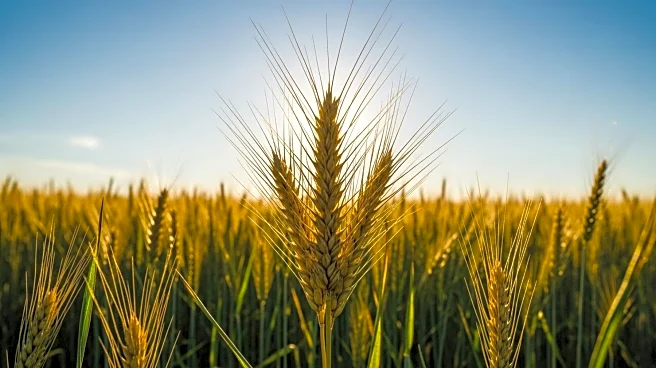What is the story about?
What's Happening?
The Rosario grains exchange in Argentina has raised its forecast for the 2025/26 wheat harvest to 23 million metric tons, citing high yields due to abundant soil moisture. This new estimate marks an increase from the previous forecast of 20 million tons and ties the production record set four seasons ago. The favorable weather conditions, including above-average rainfall, have contributed to the high yields, particularly in the province of Buenos Aires. The wheat harvest is expected to begin in the coming weeks and conclude in January. The exchange also maintained its estimates for soybean and corn production, with corn planting 28% complete.
Why It's Important?
The increased wheat forecast is significant for Argentina's agricultural sector, which plays a crucial role in the country's economy. As the world's third-largest corn exporter and leading supplier of soybean oil and meal, Argentina's agricultural output impacts global markets and trade dynamics. The favorable conditions for wheat production may enhance export opportunities and strengthen Argentina's position in international trade. The forecast also reflects the importance of weather patterns in agricultural planning and production, influencing economic stability and growth.
What's Next?
Argentine farmers are preparing to begin the wheat harvest, with expectations of high yields driving optimism in the agricultural sector. The increased production may lead to expanded export opportunities, benefiting the economy and trade relations. Stakeholders, including farmers and exporters, will monitor weather conditions and market demands to optimize production and distribution strategies. The situation may also influence future agricultural policies and investments in infrastructure to support sustainable growth.
Beyond the Headlines
The forecast highlights the critical role of environmental factors in agricultural success, emphasizing the need for adaptive strategies to manage climate variability. The situation underscores the importance of sustainable agricultural practices and investments in technology to enhance productivity and resilience. It also reflects broader trends in global agriculture, where countries must navigate environmental challenges to maintain competitive advantages in international markets.














